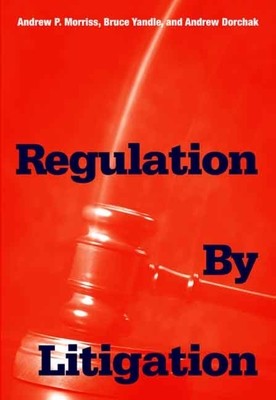
- We will send in 10–14 business days.
- Author: Andrew P Morriss
- Publisher: Yale University Press
- ISBN-10: 0300120028
- ISBN-13: 9780300120028
- Format: 16.3 x 23.6 x 2.5 cm, hardcover
- Language: English
- SAVE -10% with code: EXTRA
Reviews
Description
Federal and state regulatory agencies are increasingly making use of litigation as a means of regulation. In this book, three experts in regulatory law and theory offer a systematic analysis of the use of litigation to impose substantive regulatory measures, including a public choice-based analysis of why agencies choose to litigate in some circumstances.
The book examines three major cases in which litigation was used to achieve regulatory ends: the EPA's suit against heavy duty diesel engine manufacturers; asbestos and silica dust litigation by private attorneys; and private and state lawsuits against cigarette manufacturers. The authors argue that litigation is an inappropriate means for establishing substantive regulatory provisions, and they conclude by suggesting a variety of reforms to help curb today's growing reliance on such practice.
EXTRA 10 % discount with code: EXTRA
The promotion ends in 10d.15:12:35
The discount code is valid when purchasing from 10 €. Discounts do not stack.
- Author: Andrew P Morriss
- Publisher: Yale University Press
- ISBN-10: 0300120028
- ISBN-13: 9780300120028
- Format: 16.3 x 23.6 x 2.5 cm, hardcover
- Language: English English
Federal and state regulatory agencies are increasingly making use of litigation as a means of regulation. In this book, three experts in regulatory law and theory offer a systematic analysis of the use of litigation to impose substantive regulatory measures, including a public choice-based analysis of why agencies choose to litigate in some circumstances.
The book examines three major cases in which litigation was used to achieve regulatory ends: the EPA's suit against heavy duty diesel engine manufacturers; asbestos and silica dust litigation by private attorneys; and private and state lawsuits against cigarette manufacturers. The authors argue that litigation is an inappropriate means for establishing substantive regulatory provisions, and they conclude by suggesting a variety of reforms to help curb today's growing reliance on such practice.


Reviews